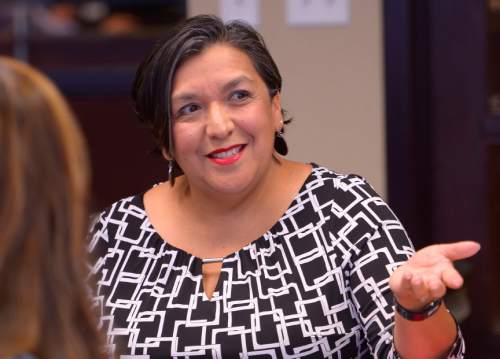This is an archived article that was published on sltrib.com in 2016, and information in the article may be outdated. It is provided only for personal research purposes and may not be reprinted.
Utah now has the nation's second-largest gender wage gap — with women earning 67 cents for every dollar paid to men. Over a 40-year career, that means they would make $663,440 less.
"Women in Utah shouldn't have to work 59 years to make what a man does in 40 years," said Emily Martin, the National Women's Law Center's vice president for workplace justice.
Her group released a study Monday about the "lifetime wage gap," based on U.S. Census Bureau estimates for wages between 2010 and 2014.
It said Utah women who work full time now earn about $16,586 less than men annually — $34,351 compared to $50,937.
Louisiana, where the gap is $16,796 per year, is the only state worse than Utah, the study said. The average gap nationally is $10,762, and U.S. women are paid 79 cents on average for every dollar earned by men.
While the resulting lifetime gap in Utah of $663,400 "is a big number, it's even bigger for women of color," Martin said. For example:
• Latinas in Utah would earn $1,135,200 less over a 40-year career, compared with white, non-Hispanic men.
• American Indian women in Utah would earn $1,043,600 less.
• Black women in Utah would earn $950,720 less.
• Asian-American women in Utah would earn $724,280 less.
Martin said that for those women of color, "Race and gender discrimination compound in a way that has a really, really huge price tag attached to it."
A study last year by the Institute for Women's Policy Research said that at rates of progress since 1959, Utah's gender wage gap will not disappear until 2102 — in 86 years.
Another study last year by University of Utah researchers, working with Voices for Utah Children, found that 73 percent of the wage gap in the Beehive State comes from discrimination — or paying women less because they are women.
It said the other 27 percent came from factors such as a lower rate of college degrees among women or more of them working in industries that have lower pay.
Martin said while "there are laws against employment discrimination," the Voices for Utah Children findings suggest that "those laws need to be updated and strengthened."
One example is that no strong federal protections exist "to ensure that co-workers can talk about how much they make without being punished by their employer," she said. "That makes it very hard to know if you are being paid less than the man down the hall," and suggests changing that.
Martin added that most of the states with large wage gaps have a lot of "occupational segregation," in which "some of the higher-wage industries may be male-dominated … while low-wage jobs — retail, waitressing, jobs like that — are female dominated."
If such states also have lower minimum wages — as Martin notes that Utah does — she said they tend to have bigger wage gaps because women are overrepresented among low-wage workers.
"So when the minimum wage goes up, women disproportionately benefit," Martin said. "And when a minimum wage is lower, women are disproportionately harmed."
A proposal (HB195) to boost the state minimum hourly wage to $12 was shot down quickly in the 2016 Utah legislative session.
The findings, Martin said, should be "a call to action" for Utah.
"Women can't afford to lose hundreds of thousands of dollars — over $1 million in some cases — over their careers. And certainly the families depending on women's earnings can't afford to lose that. So really everybody has a stake in ensuring that women are being paid equally and fairly."
Because of Utah's large wage gap, the Legislature in 2014 created the Women in the Economy Commission to study the problem and suggest remedies.
State Rep. Rebecca Chavez-Houck, D-Salt Lake City, is co-chairwoman of that commission, and she worries about Utah again dropping in rankings.
"There's a lot of talk about Utah's wonderful economy and how great we're all doing," she said. "But we're leaving people behind when you've got half the population that disproportionately is not receiving comparable pay."
She said her commission is conducting research that includes focus groups to identify barriers for women to help overcome them. It is also working with universities to look at barriers women face for college education and the role that low-wages for women may play in intergenerational poverty.
She said tackling such problems to break the cycle of poverty is impossible "if we don't have a candid look at why our Utah women are making disproportionately so much less than other women in the workforce across the nation."



